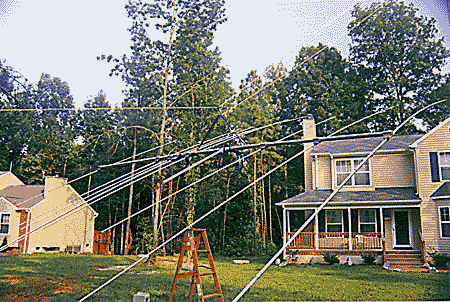TOWER PICTURES 3
|

The Force-12 C-3E trapless tribander comes neatly packed
in one box. The segments for each element are telescoped
inside each other, pre-drilled for rivets, and each
bundle is marked to identify the element. The segmented
boom already has mounting flanges for each element
pre-installed. I chose the all-stainless optional upgrade
for reduced maintenance. After a few hours in the heat of
August '99 (98 degrees!) with a pop riveter, I had a nice
looking yagi antenna. The boom is 18 feet long, and the
longest element is approximately 36 feet across.
Surprisingly, the whole antenna only weighs 37 pounds.
|

Using a prusik knot, I attached a carabiner and a pulley
on the mast to hold a tram line. The antenna rides up the
tram line like a cable car from a point 120 feet away
from the tower. Here, I have it hauled up half-way with a
long coaxial pigtail to ground level to check the tuning
before setting the final rivets.
|

Here it is, all tuned and riveted, on a beautiful,
windless evening in August, ready to go up. I have tilted
the leading elements up ahead of time to help clear the
upper guy cables.
|

Handy helper ham friends (ground squirrels) for the big
day: (L-R) Gordo, AE4RB; Newtz, KU4BB; Mick, KU4KW; and
me. No rabbit ears seen in this take! Thanks again, guys!
|

Here's a better view where you can see the RG-213 coaxial
pigtail that I have pre-installed. I formed a coaxial
choke balun (black ring hanging under the boom on the
left) in the pigtail, using 6 turns at 8" diameter.
The white, PVC assembly taped to the boom is a 'tiller'
with a light, nylon tag line hanging from it. As the
antenna is hauled up, light tension on this line keeps
the antenna from spinning, and allows some steerage in
skilled hands. Thanks again to the 'ground crew'!
|

At the working point of the antenna tram. The overhead
line is pulled taught from the mast on the tower, over my
house, to a distant tree in the front yard. Over it rides
a pulley. A single carabiner through the pulley cinches
the two nylon choker slings that suspend the antenna and
the haul line. The haul line, under the tram line, also
goes up to the mast, then through a pulley, and back down
to ground in the back yard. I used 3/8" twisted
polypropylene for both lines. The choker knots in the
slings face in opposite directions to help stabilize the
boom.
|

Thar she goes! It's halfway up, directly above my home,
as I await it at 110'. In the still air, the beam seems
to just levitate right up magically, without spinning.
This picture was taken from a spot right next to the tree
that the tram line was tied off to.
|

Once the leading element tips cleared the top guy cables,
I twisted the boom in the slings to level the elements
before raising the final few feet. My guess on the pulley
height was right-on, accounting for the sling height, as
I mated the boom and mast mounting plates. Hurry up and
get them bolts in, boy! I had already trammed up the
Cushcraft 13B2 2-meter beam seen here above me.
|

This is as far as I go! I'm standing on the top plate of
the tower, making the final alignment on the 2-meter beam
at the 116' level. I have sent the slings and tiller back
down to ground on the tram line.
|

Here's most of my antenna arsenal. From bottom to top:
Diamond discone scanner antenna @ 85', Hustler dual-band
VHF/UHF vertical @ 90', Force-12 C-3E triband HF beam @
112', Cushcraft 13B2 VHF beam @ 116', and lightning rod
(126' at top). Lightning rod? You bet! Gotta give it a
preferred path to ground, preferably NOT through one of
my antennas!
|
Back
to main tower page
|
Good luck and
have fun with your tower project!
--...MARK_N1LO...--
|
since 12/21/99